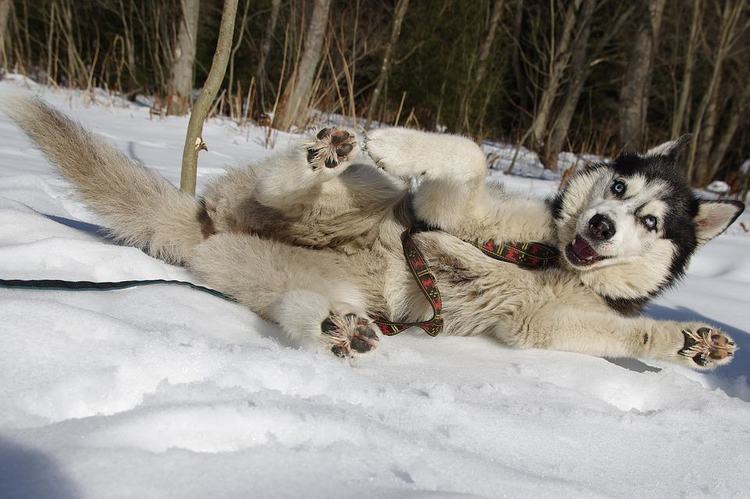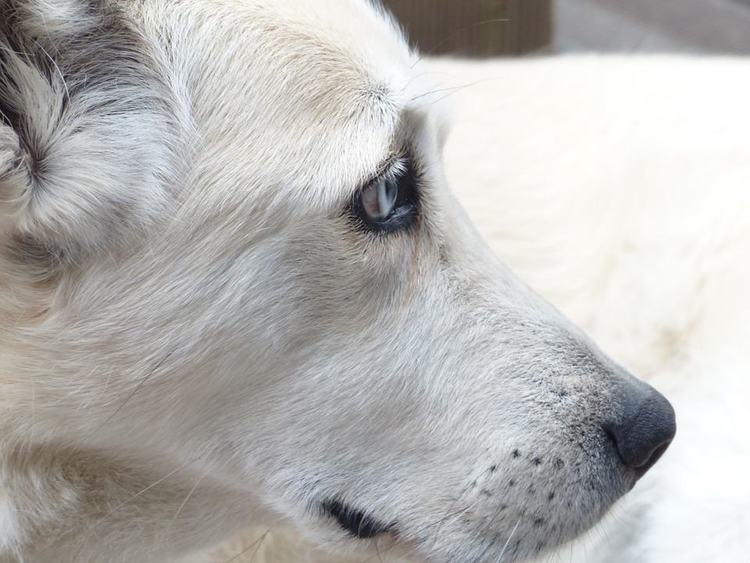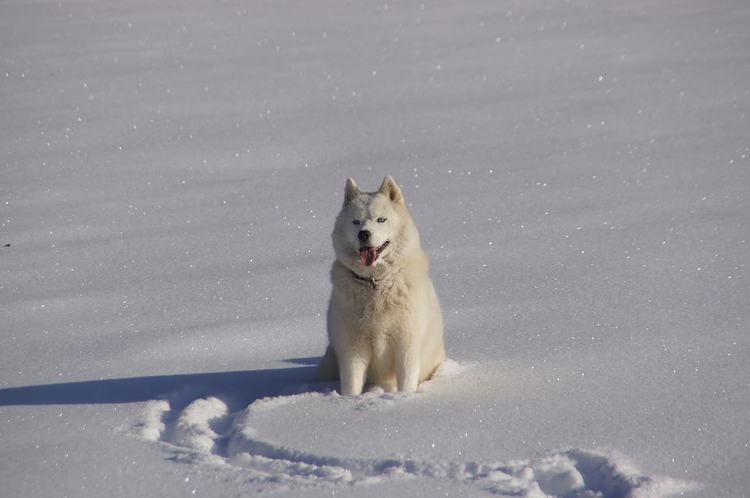Huskies are some of the most popular pets on the planet, and certainly some of the most majestic — but how long can you expect them to go on being your best friend?
What’s the average husky lifespan?
How long do huskies live – on average?
We’ve got the answer, as well as some information on how to keep your husky healthy, and what genetic diseases they be at risk for.
Let’s find out…
How Long Do Huskies Live On Average?

The Siberian husky lifespan is, on average, between 12 to 15 years.
If you’ve got a mini husky, you may wonder if they’ll live longer or shorter than their full sized counterparts.
The answer is about the same, however.
Mini huskies are not actually a different breed of dog. They’re just really small huskies, so their lifespan is almost exactly the same as full size huskies.
Females will generally outlive male huskies in the same environment, but not by much.
Risk of Hereditary Diseases in Huskies
Of course, there are some things that can reduce the husky lifespan — injury, accident and inherited diseases, in particular.
Luckily, Siberian huskies are a very healthy breed of dog. They tend to not have fatal hereditary diseases.
However, they are susceptible to several old age ailments that affect many other breeds of dog too. As they get older, your husky may be at increased risk of seizures or various eye ailments.
Though rare, some huskies (like many other medium to large breeds) may suffer from hip dysplasia. Hip dysplasia is a condition of abnormal structure of the hip joint, resulting in severe pain and arthritis.
Huskies used for sled racing may have additional health problems, such as bronchitis and other lung illnesses or gastric diseases. Some of these conditions are simply caused by age and are almost impossible to completely prevent.
That doesn’t mean that there aren’t things you need to do to prolong the lifespan and comfort of your Siberian husky though…
Keeping Your Husky Healthy

Weekly Grooming
Grooming is an underrated part of keeping your husky in tip top condition.
A healthy, shiny coat and skin will reflect the state of your dog’s health. If your pup suffers from dry skin, fleas or excess shedding, they’re likely to be uncomfortable and miserable.
While you should limit the number of baths you give your husky, you should commit to brushing them every day.
Huskies have a double layer coat; a thick, dense undercoat and a long, straight topcoat. This is to provide them with temperature regulation according to the seasons.
If you don’t brush them regularly, they could end up with painful mats and tangles — plus the shedding can easily get out of control.
Daily Exercise
Siberian huskies were bred to be working dogs, so they have a lot of energy.
The ASPCA states “they exhibit high energy indoors, have special exercise needs, and may be destructive without proper care.“
And don’t we know it!?
Make sure to walk and exercise your Siberian Husky every day.
Daily exercise also helps to manage their weight which can keep them healthy and away from the risk of diabetes and obesity related conditions.
Make Sure They Don’t Overheat
Siberian huskies can live in all climates, but there’s no doubt that their coat is meant for survival in harsh arctic weather.
It insulates and keeps the husky warm during the winters and reflects sunlight during the summers.
However, in more temperate climes, it is very easy for a Siberian husky to overheat.
Keep your husky inside during warmer weather. Provide shade and water whenever your husky is outside. Most importantly, do not shave its coat, as its coat is important in regulating its temperature (even during the summer!). Without its coat, your husky may end up sunburned and unable to maintain proper temperature.

Proper Food
A healthy balanced diet — with minimal table scraps — is the best way to keep your husky fit and well.
This is especially relevant for mini huskies. If you want your mini husky to live out its full lifespan, you need to feed it the right type of food.
Since mini huskies are just very small huskies and not an actual small dog breed, they are not well served by small-breed dog food formulas. Instead, feed your mini husky a diet fit for active dogs.
See more: the best dog food for huskies.
How to Extend the Husky Lifespan
Don’t Let Your Dog Escape
Escaped huskies become exposed to bad weather, injuries, and potential attacks from other animals. Escaped huskies rarely live out their full 15 year lifespan and instead succumb early to illness and malnutrition in addition to the dangers mentioned above.
It is critical that you don’t let your husky or mini husky escape.
However, this can be difficult. Huskies and mini huskies are very energetic dogs and are prone to escaping. They are very good at jumping over, tunneling under, or simply biting through fencing.
Check out how fast some huskies can run when they’re let off the lead:
The ASPCA recommends a fence at least six feet tall for huskies, though higher is better. Electric pet fences are not necessarily effective for this breed either.
So in addition to investing in a high fence, it is highly encouraged that you engage in regular dog training.
Huskies and mini huskies are intelligent but also very high energy, so it is best to train them to respond and return to your call before you consider letting them off the lead at the park.
Repeat training regularly — every day –and use regular positive enforcement. The earlier training begins the better. However, it is never too late to start!
Regular Vet Visits
Yes, common sense, but the importance of regular vet checkups cannot be overstated.
Health problems can be nipped in the bud before they become a more significant issue.
Age related problems can begin to be managed during the early stages, increasing both the lifespan of a Siberian husky and their comfort. Since huskies are such a healthy breed, many husky owners tend to neglect this important factor in keeping your husky alive and well.
Make sure that your husky or mini husky sees the vet for regular checkups.
If you take good care of your pet, they will live out their full husky lifespan happily and healthily. They will be an excellent companion for years to come – paying back everything you spent on them and more!

Siberian Huskies’ average life span is not up to 15 years; this is erroneous; their average life span is between 12 to 14 years. I have been raising Siberian Huskies for over 20 years now. And our local veterinarians confirm what I am saying here. I have one who died 2 weeks ago who would have turned 16 next month, and her litter mate is going to make it to her 16th b-day, and I have 2 who are to turn 15 on September 19th. But that is unusual — and it is because I am a dog musher, I have taken outstanding care of my dogs with the best food money can buy and the best kept kennel and they have been given the best exercise physically, emotionally, and mentally – because they were bred for dog sledding – that is what they live for. Ordinarily, unless cancer should strike one of my dogs, my dogs usually live up to 14 years, 10 months — I have had 4 who have exceeded 15 years, and that is not the norm for Siberian Huskies.
Sincerely,
Catherine Zylstra\
Musher, WA State
my dog is a siberian husky to and i now how you fill wen you lose a dog